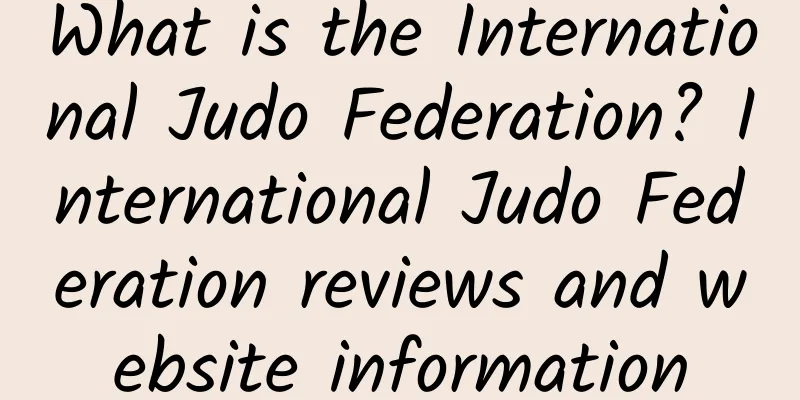What is the International Judo Federation? International Judo Federation reviews and website information

|
What is the website of the International Judo Federation? The International Judo Federation (IJF) is an international sports organization founded in 1951 and headquartered in Lausanne, Switzerland. It has more than 200 member associations and hosts events such as the World Judo Championships. Website: www.ijf.org The International Judo Federation (IJF): the core of the global judo movementThe International Judo Federation (IJF) is the highest governing body of judo in the world. Founded in 1951, the IJF is headquartered in Lausanne, Switzerland, which makes it neighbors with many international sports organizations and together they form the center of the international sports world. As a traditional martial art originating from Japan, judo has gradually developed into a competitive sport that is popular all over the world under the promotion of the IJF. The IJF has laid a solid foundation for the development of this sport by formulating rules, hosting competitions and promoting cooperation among judo associations in various countries. At present, IJF has more than 200 member associations, covering almost all countries and regions. These member associations are not only an important force in the global spread of judo, but also the basis for the implementation of IJF's policies and activities. From the World Judo Championships to the Olympic Judo Competition, to various levels of competitions and training programs, IJF has always been committed to promoting the popularization and development of judo, while ensuring its fairness, safety and sustainability. As an international sports organization, IJF not only focuses on the technical aspects of judo, but also emphasizes its educational value and social significance. Judo is not just a sport, but also a philosophy of life. It advocates the spirit of "starting with courtesy and ending with courtesy" and cultivates athletes' discipline, respect for others and ability to transcend themselves. Through these core values, IJF hopes to pass on the spirit of judo to more people, thereby having a positive impact on society. If you want to know more about IJF, you can visit its official website: www.ijf.org . This website is not only a window to understand the latest developments in judo, but also an important platform to connect judo enthusiasts around the world. History of Judo and Background of the Founding of the IJFThe origins of Judo can be traced back to the ancient Japanese martial arts tradition. As a fighting art that combines strength, skill and wisdom, Judo was first created by Jigoro Kano in 1882. Through the study and improvement of traditional jujutsu, he created a new martial art that focused on both actual combat and moral cultivation, and named it "Judo". Jigoro Kano's philosophy not only changed the way martial arts were taught, but also promoted Judo as an educational tool that could improve personal character and physical fitness. As judo spread rapidly in Asia and around the world, it became increasingly important to establish a unified international management organization. In 1951, at a meeting held in Paris, France, judo representatives from many countries jointly decided to establish the International Judo Federation (IJF). This move marked that judo officially entered a new stage of international development. The establishment of the IJF not only provided a platform for cooperation and exchange for judo associations in various countries, but also established unified competition rules and technical standards for judo. Since its establishment, the IJF has been committed to promoting the globalization of judo. By continuously expanding the number of member associations, the IJF has successfully brought judo to every corner of the five continents. At the same time, the IJF has also actively participated in the Olympic movement, making judo an official competition event for the first time at the 1964 Tokyo Olympics. This achievement not only enhanced the international status of judo, but also made the sport more widely recognized and supported. IJF's main responsibilities and missionAs the highest governing body of international judo, the IJF has a number of key responsibilities to ensure the healthy development of judo around the world. First of all, the IJF is responsible for formulating and maintaining the rules and standards for judo competitions. These rules cover everything from basic technical movements to match penalties, ensuring that every match can be conducted on a fair and just basis. In addition, the IJF also regularly updates the rules to adapt to the development needs of modern judo and resolve any problems or disputes that may arise. Secondly, the IJF is committed to organizing and supervising various international judo events. The most influential of these is the World Judo Championships, which is held every two years and attracts top judokas from all over the world. In addition to the World Championships, the IJF also hosts a series of other levels of events, such as Grand Slams, Masters, and regional championships. These events not only provide a stage for athletes to show their strength, but also bring exciting competition experiences to the audience. In addition, IJF is also responsible for promoting judo. Through cooperation with member associations in various countries, IJF has launched many training programs and educational programs for different groups of people. For example, the judo enlightenment courses for teenagers help them cultivate their interest in judo from an early age; the professional training programs for coaches improve the teaching level and training quality. These efforts have enabled judo to penetrate into more communities and schools, expanding its influence. Finally, IJF attaches great importance to the cultural heritage and social value of judo. By promoting the philosophy of etiquette, respect and self-improvement advocated by judo, IJF hopes to make this sport not only a competition in the arena, but also an important tool for shaping personality and promoting social harmony. IJF's organizational structure and operating mechanismIJF has a complex and efficient organizational structure consisting of multiple levels and departments to ensure that its various functions can be carried out smoothly. At the highest level, IJF has a General Assembly, which is the place where representatives of all member associations participate in decision-making. The General Assembly is responsible for reviewing and approving IJF's strategic planning, budget and other major matters. Normally, the General Assembly meets once a year, but special meetings may be held as needed. Under the Congress, the IJF has established an Executive Committee, which is a team consisting of the President, Vice President and other key members responsible for daily management and decision-making. The tasks of the Executive Committee include supervising the organization of various events, coordinating relations with member associations, and promoting the overall development of judo. In addition, the IJF has also established a number of specialized committees, such as the Technical Committee, the Referee Committee and the Anti-Doping Committee, which are responsible for specific areas of affairs. IJF's operating mechanism relies on a sound management system and a transparent financial system. In order to ensure the effective use of funds, IJF has established a strict auditing procedure and regularly reports financial status to member associations. At the same time, IJF also actively seeks external support, including funding from sponsors, partners and government agencies, to maintain the normal development of its various activities. It is worth mentioning that the IJF attaches great importance to cooperation with the International Olympic Committee (IOC) and other international sports organizations. This partnership not only helps the continued presence of judo in the Olympic Games, but also provides the IJF with more resources and opportunities to further promote the globalization of judo. World Judo Championships and other important eventsAs one of the most important events of the IJF, the World Judo Championships has become the most watched event in the global judo community since its first event in 1956. Held every two years, the event brings together top judokas from all over the world, who compete fiercely in all weight classes for both men and women. The World Judo Championships not only showcases the highest level of judo, but also sets an example for the younger generation, inspiring them to pursue excellence. In addition to the World Judo Championships, the IJF also hosts a series of other high-level events, including the Grand Slam and Masters. The Grand Slam is held in different cities every year, attracting many top players, while the Masters invites top-ranked players to participate, further enhancing the competitiveness and viewing value of the competition. In addition, IJF also organizes many regional competitions, such as the European Judo Championships, the Asian Judo Championships, etc. These competitions not only provide more opportunities for players from various countries to participate, but also promote judo cultural exchanges between different regions. The success of all these events is inseparable from the careful planning and strict management efforts of the IJF. From venue layout to referee selection, from player registration to event live broadcast, the IJF strives to achieve perfection to ensure that every game can meet international standards. The educational value and social impact of JudoJudo is not only a competitive sport, but also a philosophy of life with profound educational value. By practicing judo, people can not only improve their physical fitness, but also cultivate a strong will and good psychological quality. IJF is well aware of this and has been committed to maximizing the educational function of judo. In terms of youth education, IJF has launched a series of judo courses specifically for children and teenagers. These courses not only teach basic techniques and rules, but also emphasize the etiquette and moral norms contained in judo. By learning the spirit of "starting with courtesy and ending with courtesy", children learn how to respect others, how to face failure, and how to work in a team. This all-round educational approach makes judo an effective tool for character building. At the social level, IJF actively promotes the social responsibility of judo. Through cooperation with non-governmental organizations and charities, IJF has launched many public welfare projects to help disadvantaged groups improve their quality of life through judo. For example, in some developing countries, judo is used as a means to promote gender equality and community integration, helping women and ethnic minorities gain more opportunities and equal rights. In addition, IJF also uses the platform of judo to call on the world to pay attention to issues such as health and environmental protection. By hosting green events and promoting a healthy lifestyle, IJF hopes to contribute to building a more sustainable future. Looking to the future: IJF’s vision and challengesAlthough the IJF has made remarkable achievements in the past few decades, in the face of a rapidly changing world and an increasingly competitive sports environment, the IJF still needs to constantly adjust its strategies and meet new challenges. In the future, the IJF plans to further strengthen its digital transformation and improve event management and audience experience by developing smart applications and online platforms. At the same time, the IJF will also increase its investment in emerging markets and strive to get more countries and regions involved in judo. However, the IJF also faces many challenges. For example, how to balance tradition and innovation, how to deal with the impact of economic fluctuations on event organization, and how to attract more young people's attention while maintaining the competitive level. These problems require the IJF to solve with an open mind and innovative thinking. Regardless, IJF always believes that judo is a sport that can change the world. Through unremitting efforts, IJF hopes to continue to promote the development of judo, so that more people can benefit from it and jointly create a more harmonious and beautiful society. If you are interested in the IJF and its activities, please visit its official website: www.ijf.org , where you can find all the information about judo. |
<<: How is Northeast Lotte Golden Eagle? Northeast Lotte Golden Eagle review and website information
Recommend
How to eat fresh daylily How to eat fresh daylily
I have seen reports of people being poisoned afte...
Steps to make candied yam
I believe that everyone has known about the method...
How to make fresh broad beans delicious
Fresh broad beans are very common in southern Chi...
How to make delicious fried corn kernels? Homemade fried corn kernels recipe
Corn is very familiar to everyone. There are many...
What is the General Insurance Association of Singapore like? General Insurance Association of Singapore reviews and website information
What is the website of the General Insurance Assoc...
How to make braised Wuchang fish Ingredients and steps for making braised Wuchang fish
Drink the water of the Yangtze River and eat Wuch...
What is Karolinska Institute like? Karolinska Institute reviews and website information
What is the website of Karolinska Institute? Karol...
Nutrition and benefits of papaya
Papaya is a tropical fruit that many people love ...
What is the Kavli Institute for Theoretical Physics like? Kavli Institute for Theoretical Physics reviews and website information
What is the website of Kavli Institute for Theoret...
How to make delicious stewed beans and potatoes
Stewed beans with potatoes is a very classic home...
How to peel chestnut skin easily? Tips on how to peel chestnut skin quickly
Many people like to eat chestnuts. Not only do th...
Yellow Gelatin Porridge
How many female friends know that yellow gelatin ...
How to preserve fresh loquats and the nutritional value of fresh loquats
Loquat is a juicy and delicious fruit, rich in ce...
How is MSN France? MSN France reviews and website information
What is MSN France? MSN France is the French branc...
How is dcinside? dcinside review and website information
What is dcinside? dcinside is a famous Korean digi...









